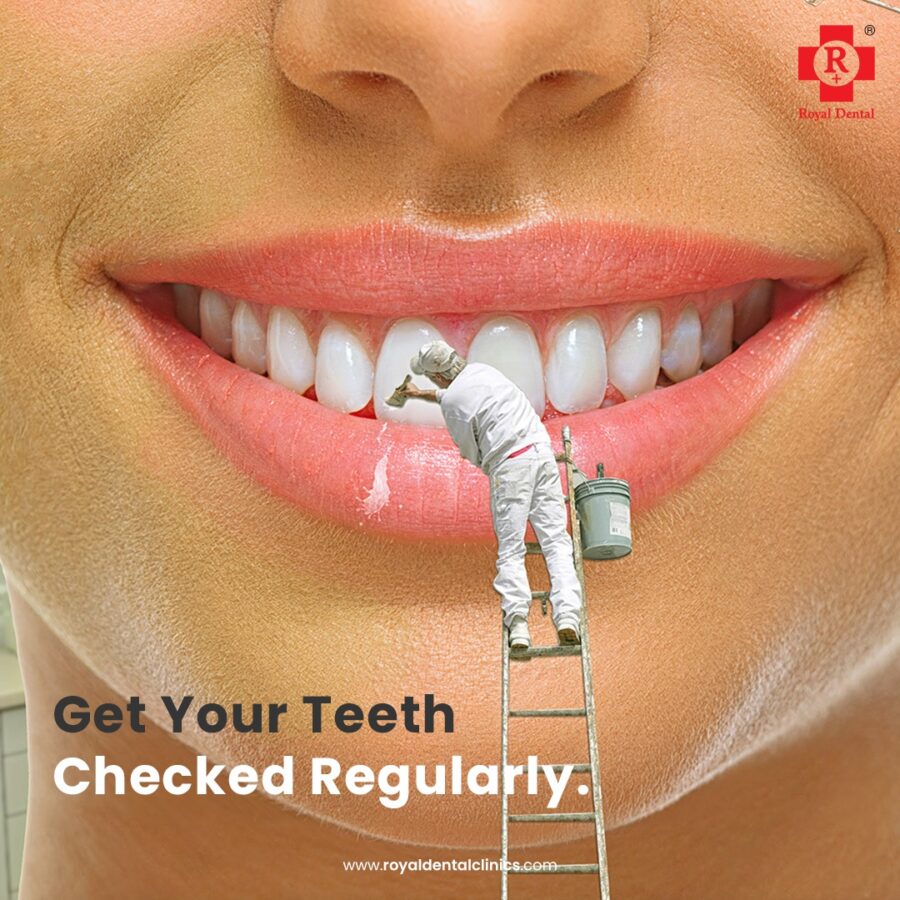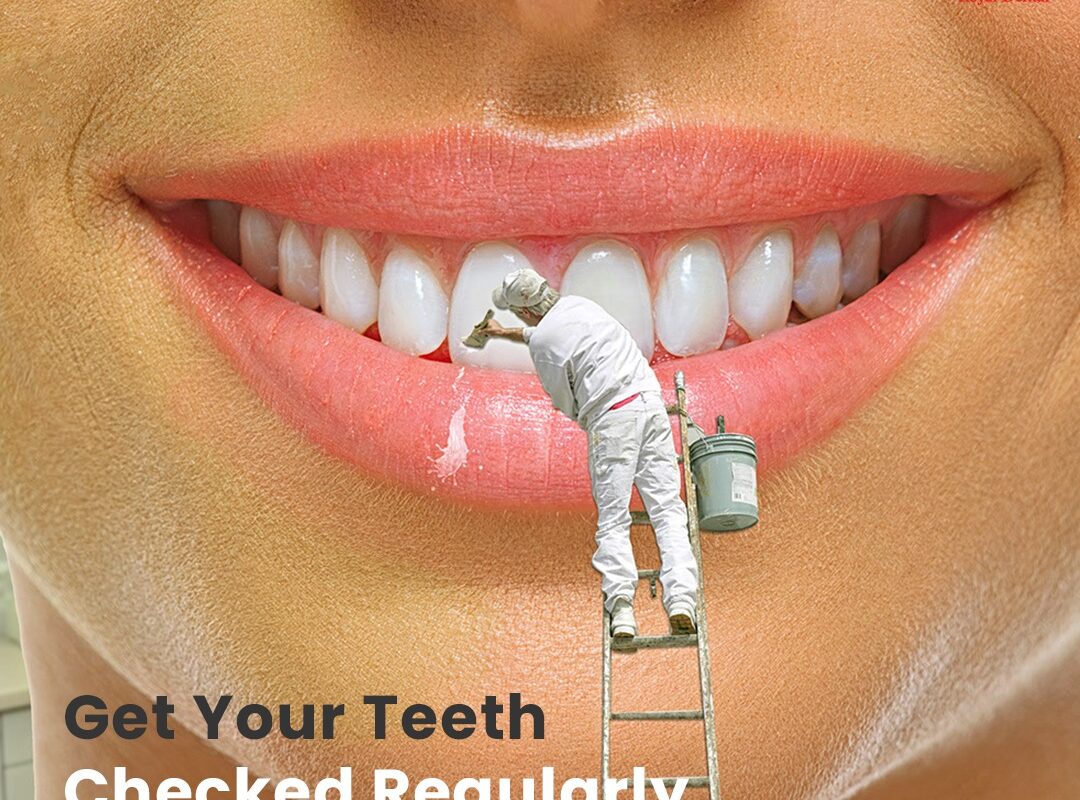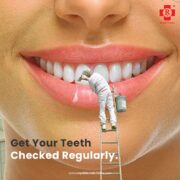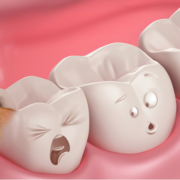Ever ask yourself, “Why does dental cleaning hurt so much?” Many of us have asked ourselves this question while writhing in the dentist’s chair. Although it shouldn’t be a painful procedure, cleaning your teeth can cause discomfort for certain people. Knowing why this occurs might help allay your worries and lessen the anxiety associated with your upcoming dentist visit. There are a number of causes that make dental cleanings uncomfortable. The accumulation of plaque and tartar, which can lead to gum irritation and inflammation, is one frequent cause. But do not worry! There are techniques to reduce discomfort when getting a dental cleaning.
What happens during a Dental Cleaning?
Before you even sit in the dentist chair for your regular cleaning, you may wonder what precisely happens during this important treatment. A dental cleaning is a comprehensive procedure that is essential to preserving your oral health, not merely to giving you a bright smile.

Dental Cleaning Process | Does it hurt?
Step 1: Initially, Dr. Chirag Chamria will examine your teeth and gums to look for any obvious problems or areas that need attention. He might inquire about how you brush your teeth and whether you’ve felt any pain.
Step 2: This is probably the most well-known aspect of cleansing. Dr. Chamria will use a scaler to delicately remove plaque and tartar from your teeth. Over time, as plaque hardens, calculus, commonly known as tartar, forms. Its removal is essential for maintaining dental health since, if left untreated, tartar can result in cavities and gum disease.
Step 3: After the tartar is gone, a revolving brush or rubber cup will be used along with gritted toothpaste to polish your teeth. This procedure helps get rid of any surface stains and remaining plaque, in addition to leaving your teeth feeling clean and smooth.
Step 4: Flossing is essential, even in the dentist’s office! To make sure that any last bits of food particles and plaque are eliminated from those difficult-to-reach places, Dr. Chamria will floss in between your teeth.
Step 5: To remove any last bits of waste from your mouth, rinse it after giving it a good cleaning and shine. A fluoride rinse may be recommended by Dr. Chamria to help strengthen your teeth and stave against cavities.
Tartar & Plaque Removal: Necessary for Oral Health
- Cavity Prevention: Plaque contains bacteria that produce acids, which can erode tooth enamel and lead to cavities.
- Gum Disease Prevention: Tartar buildup irritates the gums, leading to inflammation and gingivitis. If left untreated, this can progress to a more severe gum disease.
- Fresh Breath: Removing plaque and tartar helps combat bad breath, as these substances harbor odor-causing bacteria.

Detecting Problems Early to Prevent Pain
Gum Disease: Early signs of gum disease, such as redness, swelling, and bleeding, can be detected during the cleaning. Early intervention can prevent the progression of gum disease, which can cause pain and tooth loss.
Cavities: By examining your teeth closely, the hygienist can identify cavities in their early stages. Treating cavities early prevents the need for more extensive and potentially painful procedures later on.
Oral Cancer Screening: Many dental cleanings include an oral cancer screening. The hygienist will check for any unusual lumps, bumps, or discolouration in your mouth, tongue, and throat.
Importance of X-rays
X-rays can show problems including cavities between teeth, bone loss, and impacted teeth that are not apparent during a visual examination. It assists your dentist in tracking changes over time if you’ve had dental work done in the past or are at risk for specific problems. X-rays help in creating a customized treatment plan that efficiently addresses your unique needs if any problems are found.
Dental Sensitivity
Many people worry about dental sensitivity, particularly when getting dental cleanings. When exposed to different stimuli, such as touch, temperature, or even sweet or acidic meals, it can show up as pain or discomfort.
Sensitivity to Touch
The layer of the tooth beneath the enamel is called dentin. Dentin can show through when enamel wears away from things like eating acidic foods, brushing too hard, or gum recession. The tooth’s nerves are accessible through microscopic channels called tubules found in dentin. The tooth root surfaces show through when gums recede, which can happen for a variety of reasons, including gum disease, vigorous brushing, or other issues. The root surface is more porous and softer than the protecting, hard enamel. Because of this, it becomes more sensitive to touch and temperature changes.
Gum Inflammation
Gum inflammation is the hallmark of gingivitis, the initial stage of gum disease. Gums that are inflammatory are more touch-sensitive. Scaling and probing can increase this sensitivity during a dental cleaning, which can be uncomfortable. Gum bleeding is a typical sign of gingivitis and is an indication of irritated and swollen gums. The presence of bleeding might exacerbate discomfort during the hygienist’s cleaning of the teeth and gums.

Nerve Sensitivity
Certain individuals are inherently more sensitive to tooth pain because of their genetic composition. Their teeth are more sensitive to stimuli because they can have dentin that is more exposed or thinner enamel.
After undergoing some dental operations, such as fillings or root canals, some people develop increased sensitivity. This is due to the possibility that these operations could damage the tooth’s nerves, resulting in transient or occasionally permanent sensitivity.
Prolonged grinding of teeth can erode enamel and reveal dentin, which makes teeth more sensitive. In addition to creating pain, the continuous pressure and friction on the teeth can aggravate the nerves.
Tips for Managing Dental Sensitivity
- Use a Soft-Bristled Toothbrush: Gentle brushing with a soft-bristled toothbrush can help prevent further enamel wear.
- Desensitizing Toothpaste: A special toothpaste designed for sensitive teeth can help block pain signals to the nerves.
- Regular dental check-ups: Early detection and treatment of gum disease and other dental issues can prevent sensitivity.
- Avoid Acidic Foods: Foods and drinks high in acidity can erode enamel, so limiting their consumption can help protect sensitive teeth.
Does Dental Cleaning hurt so much for all?
Everybody has a varied threshold for pain—the point at which they become aware of it. While some people have a low pain threshold and may experience pain more quickly, others have a high pain threshold, which allows them to endure more discomfort before experiencing agony.
How uncomfortable a cleaning feels can vary depending on the general condition of your gums and teeth. The cleaning procedure could be more uncomfortable if you have cavities, gum disease, or sensitive teeth.
An important contributing aspect to how someone feels discomfort during a cleaning is dental anxiety. Muscles tensing up due to anxiety might make an experience seem more painful than it is. You might expect pain or discomfort if you’ve had a bad experience with a dental cleaning in the past, which could make the current cleaning seem worse.
Factors Influencing Pain
- Gum Sensitivity: Individuals with sensitive gums may find the probing and scaling during a cleaning to be more painful. This sensitivity can be due to gum disease, genetics, or other factors.
- Tartar Buildup: The more tartar buildup there is on your teeth, the more scraping and probing the hygienist will need to do, which can lead to discomfort.
- Inflammation: Inflamed gums are more sensitive and can be painful during a cleaning. Gingivitis or other gum diseases can cause this inflammation.
- Bruxism (Teeth Grinding): Chronic teeth grinding can wear down enamel and expose dentin, leading to increased sensitivity. This can make cleanings more painful for those with bruxism.
Dr. Chirag Chamria’s Advice
Please don’t hesitate to speak with us if you are experiencing pain while having your sensitive regions cleaned or if you know you have sensitive areas. We can modify our methods or offer alternatives to alleviate pain. In order to lessen discomfort, a numbing gel can be administered prior to cleaning for people with extremely sensitive teeth or gums. Before and during the cleaning, try deep breathing exercises or other relaxation methods to help ease tension in your muscles and minimize anxiety. There will be less buildup the more often you get cleaned, which may lessen the discomfort of each subsequent cleaning. Prior to your cleaning, using a desensitising toothpaste might help lessen sensitivity and discomfort.
What to eat after a Dental Cleaning?
After cleansing, choose soft, easily chewed foods, especially if you are sensitive in any way. Mash potatoes, smoothies, yogurt, and scrambled eggs are a few examples. After washing, steer clear of hot or cold meals and beverages since they may aggravate sensitivity. Eat only things that are room temperature or a little colder. Foods high in acid can aggravate teeth. Pasta, cooked veggies, cereal, bananas, and other non-acidic foods are good choices. Sensitive teeth may get relief from dairy items like milk, cheese, and yogurt. Additionally, they supply calcium, a mineral needed for good teeth.
Avoiding Irritants
- Hot and Cold Drinks: Avoid hot coffee or tea and icy beverages immediately after a cleaning. These extreme temperatures can trigger sensitivity.
- Acidic Foods and Drinks: Citrus fruits, tomatoes, vinegar-based dressings, and sodas are acidic and can erode tooth enamel. Avoid these to prevent further sensitivity.
- Hard and Crunchy Foods: Foods like nuts, chips, and hard candies can be abrasive on freshly cleaned teeth and gums. They can also cause discomfort if you have any sore spots.
- Sugary Treats: Sugary foods and drinks can lead to tooth decay and discomfort, especially after a cleaning when your teeth are more vulnerable.
Conclusion
Gaining an understanding of the reasons behind dental cleaning discomfort is essential to overcoming anxiety and fear. For optimum oral health and pain prevention, routine cleanings are necessary. With Dr. Chirag Chamria’s expert guidance, you can achieve a pain-free, healthy smile in just one day. Put your oral health first for a better, more prosperous future. Don’t let discomfort stop you from receiving the necessary dental care.
All rights reserved by Royal Dental Implants Pvt Ltd., issued in public interest






